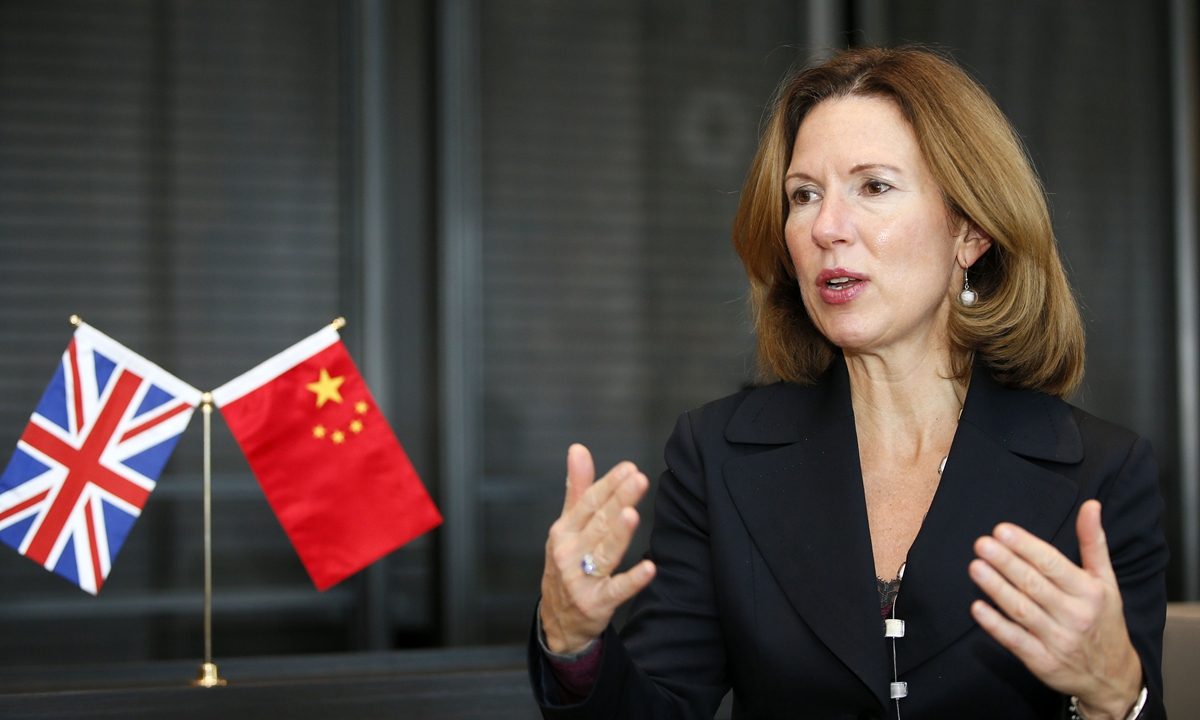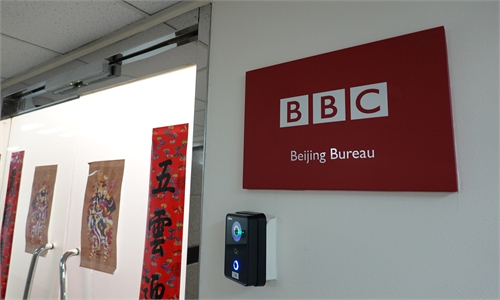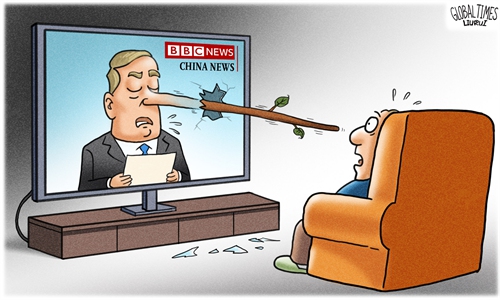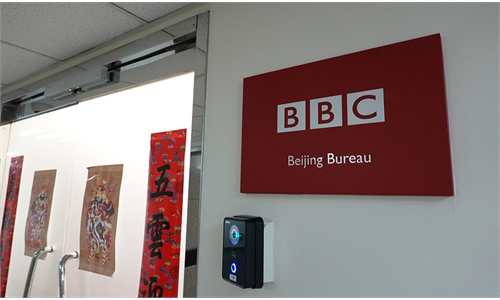UK envoy interferes in China’s internal affairs with ‘biased’ article: Chinese FM
Colonial mentality, arrogance poison bilateral relations: experts

Caroline Wilson, UK ambassador to China. Photo: VCG
The Chinese Foreign Ministry said Wednesday that diplomats are not supposed to interfere in the internal affairs of host countries, and the British Ambassador to China made irresponsible remarks about the Chinese system and media to interfere in China's internal affairs, while former Chinese ambassador to the UK Liu Xiaoming never initiated a dispute or attacked the British system.
Experts reached by Global Times on Wednesday said that Wilson's article was aimed at stirring up public opinion in China, which actually interferes with China's internal affairs and is improper and wrong as a top envoy.
The department of European Affairs of Chinese Foreign Ministry on Tuesday summoned Caroline Wilson, the UK Ambassador to China, about her publication criticizing the "worsening news environment in China," and saying that Western media's biased stories are not "China-hating" but having supervision rights.
As for the BBC and other UK media that have already exposed unprofessionalism and ideology-orienting mindset in China-related reporting, most Chinese do not recognize their "surveillance credentials," Chinese experts said.
Wilson was summoned after an article with her byline posted on the WeChat account of the British Embassy to China on March 2, saying that China has "bias" against foreign media.
Zhao Lijian, the spokesperson of Chinese Foreign Ministry, said Wilson's article kept silent about the British media's false news and untrue reports concerning China, deliberately confused news defamation with supervision, and trumpeted the so-called Western experience in an arrogant tone.
"It reflected her consistent double standard and deep-rooted ideological bias," Zhao said at the regular press conference on Wednesday.
Zhao noted that former Chinese ambassador to the UK Liu Xiaoming also published articles during his tenure in the UK, but was aimed at enhancing understanding of China and China-UK relations in an objective and positive way. And he never initiated a dispute or attacked the British system.
Liu could not even publish articles in British media as "free" as what Wilson claimed, and Liu's articles have been repeatedly rejected in recent years, Zhao said.
Wilson said in her tweet on Tuesday that "No doubt the outgoing Chinese Ambassador to the UK stands by the 170+ pieces he was free to place in mainstream British media."
"The duty of diplomatic agencies is to promote friendly relations, and diplomats have the obligation of not interfering in the internal affairs of the countries they are stationed in. This is a principle and bottom line they must abide by," Zhao said.
Observers said that the controversial article has dropped her popularity among Chinese people since Wilson took office in October 2020, when she was quickly followed by thousands of netizens on Twitter-like Weibo due to her friendly and "Chinese culture lover" image.
Li Haidong, a professor at the Institute of International Relations of the China Foreign Affairs University, told the Global Times that the ministry's warning was a reminder to the new ambassador of the need to abide by Chinese rules in China. And China is not a country that the UK can point fingers at with preposterous "civilization and ethnic superiority."
Some UK media has no professionalism and ethics in China reporting, which is seen through by the Chinese people, who do not recognize the BBC as a qualified inspector either, Li said.
Without commenting on the above issues, Wilson turned a blind eye to the UK's crackdown on Chinese media CGTN.
The missionary mentality that grew from the era of colonialism makes many Western diplomats still believe they are "the lecturers" that can judge non-Western countries, and the people in the third world cannot challenge their arrogance. This is totally out of date, especially in China, analysts said.
In recent years, whether in biased news about the 2019 Hong Kong turmoil or the disinformation about Xinjiang produced by the BBC, or the stigmatization of China's measures to prevent and control COVID-19, most Chinese people are getting more and more disappointed by the behavior of some Western journalists in China.
Western media's credibility in China is continually declining due to their double standard and ideological bias, which makes them untrustworthy or unqualified to supervise anything in China.
The growing unpopularity of the Western media in China can only be solved by reporting the changes in China objectively and impartially, rather than making China look more in line with the stereotype, said Chinese experts.
"Chinese people are now very familiar with the Western media's tactics to smear and vilify China in order to cater to Western prejudices and to maintain their discourse hegemony. If the foreign media are honest and objective to report the thriving China, then who will watch BBC?" said Wang Yiwei, director of the institute of international affairs at Renmin University of China.
Chinese people have mocked BBC on the internet. A video called "how to be a good BBC reporter" that mocks BBC tricks used to distort news through oblique shooting and post-production went viral on Chinese social media and won a thumbs up from Chinese netizens in early February.
Shen Yi, a professor at Fudan University's School of International Relations and Public Affairs, told the Global Times on Wednesday that the UK is abusing China's "gentle and nice" gesture which was misread by some British politicians as weakness and can be taken advantage of.
"Wilson had better not process the information in a fragmented way, as BBC did, and then amplify for subjective interpretation… Chinese people hate the approach. And this is also the most basic decency that a diplomat should maintain," Shen said.
Unlike the UK, China is not a country keen to solve problems by hard power, but prefers dialogue and communication. However, the ceaseless provocation from the UK shows that they need to be taught a lesson, said Shen, noting that the UK will pay the price for what they have done to undermine China-UK ties.
"The UK should actively seek ways to respond to new changes in the world. But the UK is contradictory. They need China, but also want to influence China; they cannot live without China's market, but not recognize China's way of life," Wang said.
The UK, the political broker with its fortunes tied to a slumping US, faces its worst debt problems in more than 60 years and a growing appetite for independence in Northern Ireland and Scotland, Wang said.





